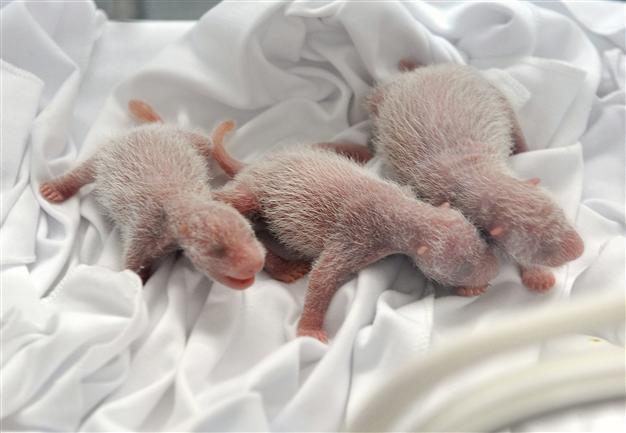Chinese zoo unveils world's 'first' surviving panda triplets
HONG KONG - Agence France-Presse

This undated handout photo released on August 12, 2014 from the Chimelong Group shows newborn panda triplets inside an incubator at a safari park in the southern Chinese city of Guangzhou. AFP Photo
A Chinese zoo has unveiled newborn panda triplets billed as the world's first known surviving trio, in what it hailed as a "miracle" given the animal's famously low reproductive rate.
The mother panda, named Juxiao, meaning "chrysanthemum smile", delivered the triplets at Guangzhou's Chimelong Safari Park in the early hours of July 29, but was too exhausted to take care of them afterwards.
Her cubs were then put into incubators while Juxiao regained her strength, and have now been brought back to their mother for nursing and are being attended to by a round-the-clock team of feeders, the zoo said.
"They were said to be the only panda triplets that have ever survived," the safari park said in a statement released Tuesday.
An official from Sichuan Wolong National Natural Reserve, considered the foremost authority on pandas, said the trio were too young to be officially recognised as "surviving" but that they were the only known panda triplets alive.
"We can only say they are surviving once they reach six months. For now they are indeed the only surviving triplets," said an official from the centre who only gave her name as Ms. Zhao.
"The triplets can be described as a new wonder of the world," Chimelong Safari Park said, describing mortality rates among newborn pandas as "extremely high".
Pictures taken earlier this month of the triplets showed the pink-coloured cubs inside an incubator with their eyes closed and bodies sparsely covered with white fur.
"The mother and babies were in good condition, but the adorable newborns were particularly inspiring," the zoo said.
The gender of the cubs was not disclosed and they would be given their names at a later date.
Pandas, whose natural habitat lies in mountainous southwestern China, have a notoriously low reproductive rate and are under pressure from factors such as habitat loss. China has about 1,600 pandas living in the wild.
Their normal breeding season is mid-April to May.
